- Home
- Dusty Richards
A Good Day To Kill Page 12
A Good Day To Kill Read online
Page 12
“Shawn, saddle us two horses. Jesus, you go with JD, Cole, and Bronc. Shawn, Roamer, and I will go settle with these robbers. Take enough supplies. If I need to make that bank meeting, I can take a stage from Tombstone. Shawn can come along with me to Tucson Thursday night, and I can make the sale closing on Friday.”
“We can do that, señor,” Jesus said. “But for land’s sake, be careful.” He was looking real serious at him. “You be very careful.”
“I’ll watch. I figure you can make more sense out of that ranch than any of them.”
Roamer, Shawn, and Chet left within the hour and made Tombstone by sundown. They slept in the hay at the livery for a few hours, found some fresh cinnamon rolls in a hole-in-the-wall café, and then left before sunup. Roamer explained the other factor in this case as they rode—the gang had another family member—Thomas Clanton.
Chet recalled the last newspaper report and shook his head. Lawbreakers were lawbreakers. If he held up stages, he needed to be arrested and tried by the law.
If they pushed hard, they would be at the base of the mountain and the canyon by midday. He and his men trotted their mounts until they could see details on the mountain and the junipers that made the mountain’s skirts. Roamer led them up the narrow trail and Ortega stepped out from the dense junipers with his rifle.
“You sure got back here in a big hurry.”
“What’s the situation up there?”
“One of them stage robbers is Israel’s younger brother, Thomas. They’ve been up there drinking and raising hell for two days. I worried they might want out, but so far they’ve been content. It’s been a long three days, señor.”
“It must have been.” Chet stepped down and turned to Roamer. “I don’t know a thing to do but to take them. If they don’t surrender, they’ll be shot. Is Dodge here?”
Ortega gave him a frown. “He wasn’t much help. I sent him back to town. I knew you were coming.”
Chet shook his head. “Get some rest. In the morning, before daylight, we’ll take them. Anyone offers resistance, we shoot them. Don’t take a chance.”
“Shawn, you take the first watch. Wake us if anyone tries to come out. No fires they can smell.”
“I am damn sure glad to see you,” Ortega said.
“Yeah, I have to be in Tucson on Friday to sign papers for the ranch.”
“But—”
“Don’t worry, it only happens when you’re a boss. Don’t ever take that job.”
Ortega yawned. “Sleep, yes.”
The crickets kept up a chorus and a few coyotes howled. That left an owl to hoot, then Chet fell asleep. Around two in the morning, Roamer woke him. “We voted to go cover the shack about four o’clock.”
“Good time.” He took over guard duty in the coolness of the high desert. Be damn cold up there on the mountain’s spine. He’d be glad to have this over with. His eyes felt dry as an alkali flat.
When he shook them, the others got up. Shawn rolled up his bedroll. “I don’t want to stay in this hotel tonight. Too many rocks.”
They all chuckled. They woke their sleeping horses and made sure they were hitched out of sight, so some escaping outlaw couldn’t find them. Then, with rifles and ammo, they started up the steep trail in the darkness.
They soon reached their goal, squatted, and looked at the darkened log cabin. The outlaws’ horses were in the corral, backed by a tall cliff wall behind it.
“Must have a spring up here,” Chet whispered to Roamer.
He nodded. “Have to be a good one to water them and their horses.”
“I will cover the back way,” Ortega offered. “Give me some time to get around there.”
“Good idea. We’ll camp here.”
Chet, Cole, and Shawn squatted down with their rifles across their laps. He could hear the horses grunting in their sleep. Once in a while, one would stomp his hoof or they’d have a kicking match to settle something private.
When he figured Ortega was in place, they moved in closer. The soft light of sunup was gradually making it plainer to see details. Using a woodpile for cover, he sent Shawn over to take a place by the corral corner. Roamer was to his left.
He fired a pistol shot in the air. “Come out hands high, or die. This is the U.S. Marshal talking. We’ll shoot anyone that comes out armed. Gun in your hand means instant death. Now, get out here before I burn that trap down around you.”
“We’re coming. We’re coming.”
What happened next was what Chet expected. They came out with six-guns blazing at all or anything. In seconds, the air was full of acrid gun smoke fogging the area. The posse’s rifles cut the armed occupants down in the doorway, and a few steps from the entrance, four men sprawled facedown. There was no wind. Not a breath. Only the sounds of the panicked horses in the pens scrambling around and whinnying—heads high over the top bars and trying to escape the hell they were caught in.
“Hold your fire. We can’t see anything.” Two individuals, coughing their heads off, soon appeared unarmed and in their underwear. Chet, pistol in hand, waved them to comb over the bodies to make sure they were unarmed.
“Any more in there?”
“No. Just us.”
“Shawn, watch those horses and try to settle them down. We’ve got them.”
Roamer and Ortega cautiously dragged each of the dead or wounded off the porch by their arms and out on the bare ground. Shawn calmed the animals in the pen so they didn’t break out, then came over to join them.
“What do we do next?” Shawn asked.
“By damn, make us some coffee. My teeth are about to float out. I haven’t had any in days,” Ortega said.
“What’s your name?” Chet asked the youngest prisoner standing barefooted in his long-handle underwear. He had his short pencil and pad in his hand.
“Tom Clanton.”
“Age?”
“Sixteen.”
“What’s your name?’ he asked the other one.
“Billy Moore.”
“Age?”
“Fifteen.”
“You boys got an early start on stage robbing, haven’t you?”
“We ain’t robbed no stages,” Clanton said.
“A judge will decide that. Shut up. Sit on the ground. We’ll have some breakfast, then get you dressed. Shawn, cuff them together.”
That completed, the young man headed back to camp to get their horses.
“We will have some food here shortly,” Ortega said as they built a fire in the ring.
“Shawn! Bring the packhorse, too,” Ortega shouted. “They don’t have any good coffee here.”
Shawn waved that he heard him and headed into the junipers and live oak for their camp.
Roamer and Chet laughed, then Chet asked Ortega, “Why don’t they have any good coffee here?”
“Cheap outlaws, boss man.”
“Any of them you drug out going to live?” he asked Roamer.
“Not to get to Tombstone, way I figure.”
“Good enough for them. When we get them tied over horses, you two can take your time. Shawn and I are going to head for Tombstone shortly. We’ll leave our horses at the O.K. Corral for you two to take back. I’ll wire Blevins to send his men to come get these two, and then Shawn and I will catch a stage to Tucson. Tomorrow, I need to buy a ranch for all of us. And we’ll take the stage back to Tubac.”
“Busy man.”
“Roamer, one day I’ll sit in a rocker on the porch and count cattle.”
“That will only be after you break both legs falling off a windmill.”
They all laughed, except the prisoners.
Shawn soon returned with his saddle horse and the pack animal. Ortega made them coffee and breakfast while the others saddled their horses. They fed the two living outlaws, then loaded the dead or dying belly down over their horses. They found some of the loot. Part of it was gold bars that outlaws hated because they were branded and hard to sell. Most of the money on them and in the dead out
laws’ pockets was fresh made.
Chet asked both boys where the rest of the money went.
“Saddles, guns, and the supplies to hole up here until things cooled down.”
So, they had all the loot that was left.
When he said good-bye, everyone wished him luck and thanked him. Then he rode double with Shawn to get to his horse. Before the sun had cleared the mountain range, they were long trotting on the dusty road for Tombstone.
Things went fast in the telegraph office. He sent a wire to Marshal Blevins, telling him to send men to take the pair to Tucson for trial. Then he wired Marge that he was leaving Tombstone to go to Tucson to sign the papers. They caught some quick food from a street vendor, then got the back-facing seats on the five p.m. stage and rocked out of town past Boot Hill for Benson and then on to Tucson in the night.
“Did we forget anything, Shawn?”
“No, sir, but when you move you really move.”
“I want a bath in Tucson, then a clean white shirt and my pants pressed for tomorrow’s signing, and some sleep.”
“I hear folks talking about your empire building. I can see, now I’ve been with you well over six months, that you have some kinda drive in you. You don’t hardly sleep and you’re up and ready to go. What powers that?”
“Before the War, there was no money in Texas. I mean, pennies were hoarded. Folks were not much richer than their slaves. Slaves were high-priced, but no one could hardly afford to buy them. We never had any slaves, but lots of our neighbors did. They raised their own. Mexican people were even poorer. They came and farmed for us each year. They were good farmers and we had some good land to grow crops. My dad fought in the war to free Texas, and they gave him and my grandfather more land for that. But the war had affected him, and Grandpa was getting on up there, too. One day, when I was fourteen, Gramps told me that I’d soon have to run that ranch and that I better learn all I could, because my dad’s mind was slipping away real fast.
“By that time, we’d built a fortress the Comanche couldn’t take, and we owned lots of cattle and good horses. But our main income came from the corn the Mexicans raised and we sold. The war ended and we took some cattle to Missouri. Lucky we lived through that drive, but we made real money selling them in Sedalia. The seat of my pants were made of deer hide.”
“What happened?”
“Oh, they’ve got lots of gravel on the way up there called flint rocks. It really crippled the Texas cattle walking on it. Then their cattle caught Tick Fever from ours and died and they blamed us. I rode up and back home with a half dozen boys still wearing Confederate clothes. That might of saved our lives, them being ex-Confederate veterans. I had fifteen thousand Yankee dollars sewed in my saddle blankets and bedroll. When I got home, that money really stunk like a sweaty horse.”
Shawn was laughing. “Stinking rich. I love that.”
“That was fifteen dollars a head for my cattle. I didn’t know the man that bought them probably made three times that when he sold them. I was young and green as grass. But I’d never seen that much money, or even heard of an amount that big being paid for anything. Texas was broke and all the folks in that state were penniless, too.
“I went home feeling like a millionaire. The next year, we took two herds of two thousand head of steers north to the new shipping pens in Abilene. I sent the money home by an outfit named Wells Fargo that said they would get it back to my San Antonio bank. It was over one hundred sixty thousand dollars. My sister, Susie, and I danced in the kitchen when I got home. But we kept it all a secret and paid our debts.
“I was afraid the whole country would collapse. They’ve had some bad depressions but none like we had in Texas before and after the war. So, when I came out here, I started expanding. No one has any money in Arizona. Ranching won’t bloom here until we get a railroad up north.”
“How did you see it coming—after the War, I mean?”
“I heard Texas steers were worth ten bucks in Missouri at the railhead in Sedalia. It was hard to get ten cents for them in Texas. What was I doing? Nothing to make money, that was for sure. My brother, Dale Allen, said I was crazy going off up there and I’d get killed.”
“What did he say when you got back?”
“That it was a fluke, and I’d never do it again and make any money. So I took two herds north the next year to show him.”
“He ever admit you were right?”
Chet shook his head. “He may have seen some light, taking that herd to Kansas, but them Reynolds murdered him.”
“I bet that was a blow.”
“Big one. Things were crashing down around me. So I went to Arizona and bought the Verde River Ranch.”
“Run by outlaws?”
“Oh, yes. It taught me many things.”
“Now six, and soon seven, ranches.” Shawn shook his head.
“Get some sleep. We’ll be busy tomorrow.”
“Thanks, I love this job. I’m learning, too. Lots.”
Chet went to sleep in his corner of the rocking coach. He slept some between horse change stops. They made Tucson by midnight, where they ate from a street vendor, then bathed at China Joe’s who pressed his pants and did their shirts. They slept in two beds in the Congress Hotel, ate a quick breakfast, hired a taxi, and at nine thirty walked in Russell’s office.
He introduced his man. “Shawn McElroy, one of my deputies. Yesterday morning, we tried to arrest six outlaws. Four chose to die. Two are in the Tombstone jail, four are at the undertakers. He’s here to learn about purchasing property and banking. We’re a little road weary.”
Russell laughed. “You make my head swim.”
“There wasn’t that much water. Are we ready to go to the bank?”
“Yes. This outlaw thing came up after you got back?”
“Yes it did. Two of my men located this gang of stage robbers in a canyon east of Tombstone. They needed backup, so they came and got me. We rode over there, surrounded them, and they tried to shoot their way out—that didn’t work. There were two teenagers in the gang—one was fifteen, the other, sixteen, was a nephew of Old Man Clanton. They gave up.” By then, the three of them were on the busy street walking to the bank.
“Wasn’t there a Clanton in the last arrest your men made?” Russell asked, waiting for a freight wagon to pass so they could cross the street.
“Yes, he was older and his name was Israel. He didn’t make it and some woman wrote in the newspaper that we’d shot an innocent man. When my men found another Clanton was in this camp, they got me.”
“My, my, you do lead a fast life.”
Shawn frowned. “Is Tucson always this busy? I mean, all this traffic?”
“Yes,” Chet said. “It’s a real busy place.”
When they entered the bank, Ralston Holmes was there to meet him, and Chet introduced both Russell and Shawn to him.
“Very nice to have you here,” Holmes said. “We have a large boardroom in the rear. Neither Mr. Townsend nor Mr. Weeks have arrived. My associate will be looking for them and we may go back and have some coffee.”
The boardroom had ceiling fans that stirred the air and it was comfortable. Chet wondered what powered them.
“What powers the fans?” Chet asked.
“A small boiler. A steam engine. I must say, it is the latest invention. It is a rather small one and the firebox needs to be seen about often, because we don’t have coal available here. We use split wood, mostly juniper, and the engineer who set it up acted like that was impossible. But it works, and since then he’s been busy installing them all over town and telling everyone that juniper wood will work. His biggest buyers are saloons, of course. They make much more money than banks.”
Weeks and Townsend arrived and Holmes took charge of the paper signing.
“Mr. Craft, you do have the papers releasing the banks?”
“Yes, they all agreed and I have them on file for my client.”
“Then this agreement is acceptable to both pa
rties, or shall I read it aloud?”
“I read the original and told my client to sign it. It contains the transfer of the cattle and horse brand on those my client is buying,” Russell said.
“We understand the contents and will accept his money,” Townsend said.
“Gentlemen, it requires both of your signatures and for you to sign the check, Mr. Byrnes.”
Weeks signed it, looked over at Shawn, and spoke out, “I don’t appreciate you bringing an armed guard to this signing.”
“My armed guard hasn’t hired any men to kill you yet, like your foreman Masters did me.”
“Gentlemen.” Holmes spoke in a placating voice, but the two men ignored him.
“My man never did that. That’s a damn lie.”
“Funny thing, Masters has disappeared. If he was innocent, why did he run?”
“No doubt, he feared you’d frame him, or worse, shoot him like you did that Clanton boy.”
“Weeks, some day you and I need to have a fistfight and decide once and for all who is right and who is wrong. But if I ever see Masters, I’m going to do what his hired guns planned to do to me. Send him to hell.”
“I’m telling you—”
Shawn blocked Weeks’s way when he started for Chet.
“Mr. Weeks, if you don’t back down, you’re going to find out why I’m here. Now back away.” Shawn stood his ground.
Weeks backed up and turned on his heel. “You ain’t heard the last of me. You and that punk gun hand of yours.”
Chet was about laughing. “Guess you’re a gun hand now, Shawn.”
“He wasn’t going to lay a hand on you or even try to draw.”
“I think you are both bullies,” Townsend said, and started to leave.
Holmes cleared his throat. “Mr. Townsend. Your client left his check here.”
“I’ll take it to him.” He grabbed it off the table and left.
When they were gone, Holmes spoke softly. “If this is repeated outside the room I will deny it. That check you signed, Mr. Byrnes, had our name and his on it.”
Chet nodded. “I saw that.”
“It only covers a portion of what he owes us on financing that operation.”

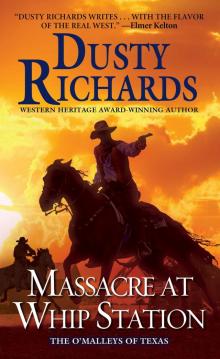 Massacre at Whip Station
Massacre at Whip Station Blue Roan Colt
Blue Roan Colt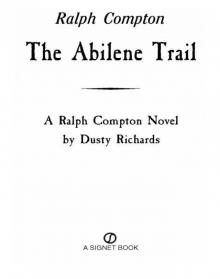 The Abilene Trail
The Abilene Trail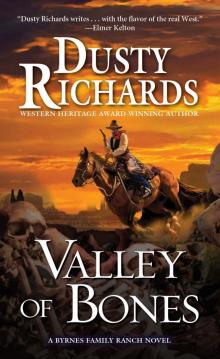 Valley of Bones
Valley of Bones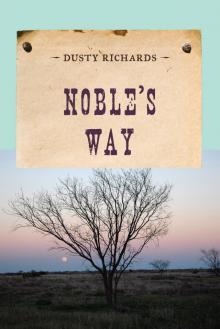 Noble's Way
Noble's Way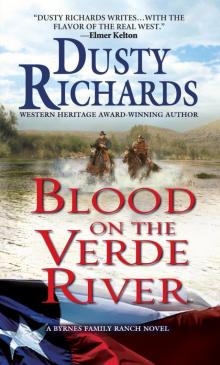 Blood on the Verde River
Blood on the Verde River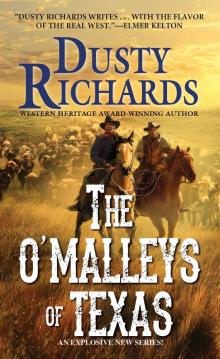 The O'Malleys of Texas
The O'Malleys of Texas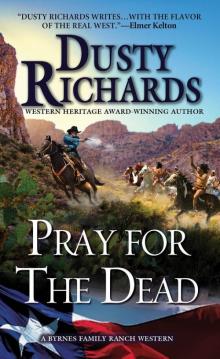 Pray for the Dead
Pray for the Dead Arizona Territory
Arizona Territory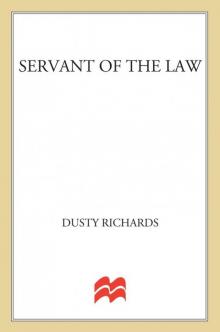 Servant of the Law
Servant of the Law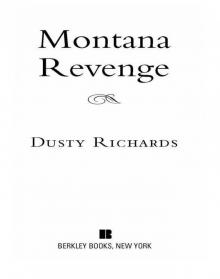 Montana Revenge
Montana Revenge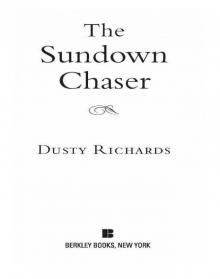 The Sundown Chaser
The Sundown Chaser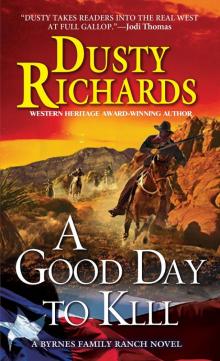 A Good Day To Kill
A Good Day To Kill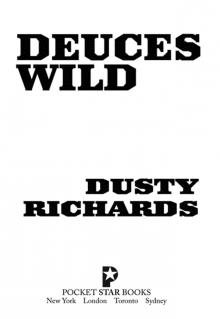 Deuces Wild
Deuces Wild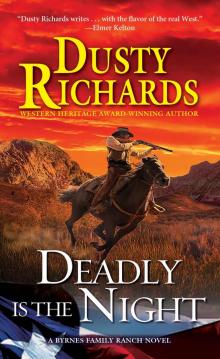 Deadly Is the Night
Deadly Is the Night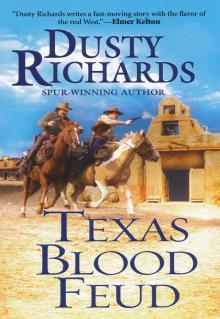 Texas Blood Feud
Texas Blood Feud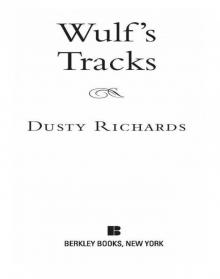 Wulf's Tracks
Wulf's Tracks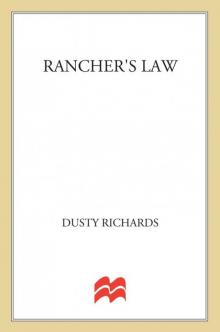 Rancher's Law
Rancher's Law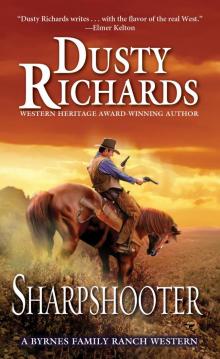 Sharpshooter
Sharpshooter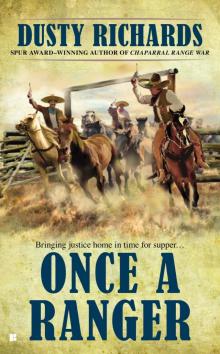 Once a Ranger
Once a Ranger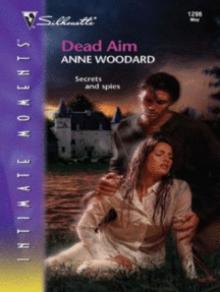 Dead Aim
Dead Aim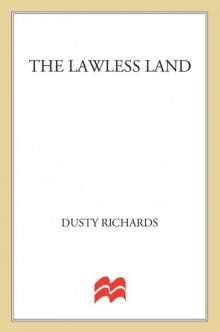 Lawless Land
Lawless Land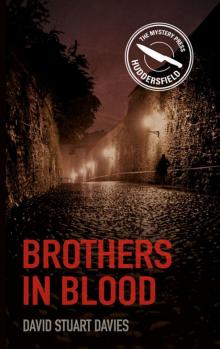 Brothers in Blood
Brothers in Blood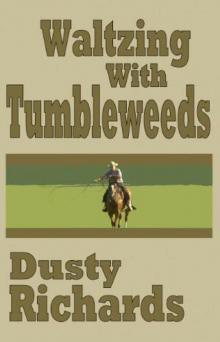 Waltzing With Tumbleweeds
Waltzing With Tumbleweeds